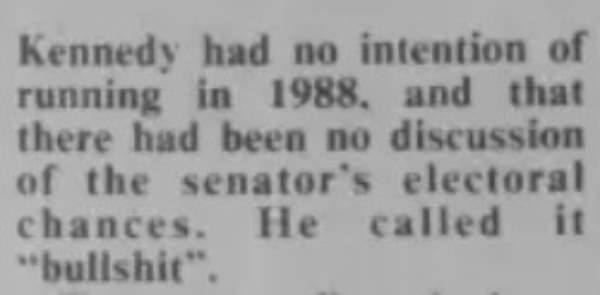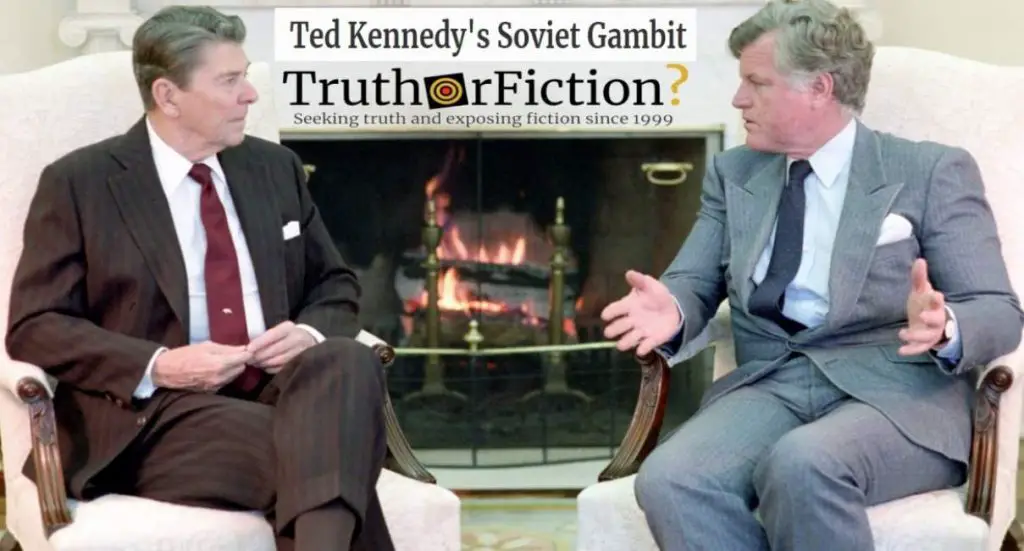For years, right-wing politicans and bloggers have leaned on the legend of a purported attempt by Democratic Sen. Ted Kennedy in 1983 to contact the leader of the Soviet Union when seeking to counter actual Republican overtures toward foreign governments.
The root of the claim — that Kennedy attempted to enlist Yuri Andropov’s assistance in unseating then-incumbent U.S. President Ronald Reagan in the 1984 presidential election — came from a May 1983 memo written by Viktor Chebrikov, then-chair of the KGB, the Soviet’s security agency.
In the memo, Chebrikov claimed that Kennedy “charged” a friend, businessman John Tunney, to convey a message to Andropov describing steps to “counter the militaristic politics of Reagan,” including both a personal meeting between Kennedy and Andropov to discuss bilateral nuclear disarmament, and putting together a series of interviews with Andropov to be aired on U.S. television emphasizing disarmament.
“A direct appeal by the General Secretary of the Central Committee of the Communist Party of the Soviet Union to the American people will, without a doubt, attract a great deal of attention and interest in the country,” Chebrikov wrote. “The senator is convinced this would receive the maximum resonance in so far as television is the most effective method of mass media and information.”
He also claimed that Kennedy was setting himself up for a 1988 presidential campaign:
At that time, he will be 56 and his personal problems, which could hinder his standing, will be resolved (Kennedy has just completed a divorce and plans to remarry in the near future). Taken together, Kennedy does not discount that during the 1984 campaign, the Democratic party may officially turn to him to lead the fight against the Republicans and elect their candidate president. This would explain why he is convinced that none of the candidates today have a real chance at defeating Reagan.
(Kennedy only ran for the presidency in 1980. He died on August 25 2009.)
The memo was first reported by the Times of London on February 2 1992; Tunney did admit to making 15 trips to the USSR during 1983 and representing “the views of some senators” during those visits.
But while he told the Times that he had told Soviet officials that “it would be good PR” if they decreased their nuclear stockpile, he denied making the overtures described by Chebrikov. According to the newspaper:
Tunney, now a lawyer in Los Angeles, rejects the thrust of the KGB memo, claiming Kennedy had no intention of running in 1988, and that there had been no discussion of the senator’s electoral chances. He called it “bullshit.”


Tunney further rejected the memo’s claims in a 2015 interview with Politifact:
“The idea that I would be handling contacts with Andropov is preposterous,” he said at the time. “The memo is completely false.”
In 2006, author Paul Kengor published what he called the actual memo in his book The Crusader: Ronald Reagan and the Fall of Communism. Three years later, he told Forbes magazine:
The document has stood the test of time. I scrutinized it more carefully than anything I’ve ever dealt with as a scholar. I showed the document to numerous authorities who deal with Soviet archival material. No one has debunked the memorandum or shown it to be a forgery. Kennedy’s office did not deny it.
However, Kengor’s claims have been rejected; as Politifact reported, a spokesperson for Kennedy told the Boston Herald in response to the Times story that while Kennedy tried — and failed — to meet with Andropov.
“The rest of the memo is KGB fiction,” the spokesperson added.
The site also noted:
When PolitiFact asked archivists at the Reagan Library to search White House files on Kennedy, they were unable to find any episode involving the USSR in 1983. A search by the Senate Historical Office didn’t find anything either.
According to PolitiFact, Stephen Cohen, a Princeton University political scientist with years of archival experience in Soviet era documents, said that many KGB documents were false and the papers cannot be taken at face value.
Diplomat Max Kampelman, who acted as the Reagan administration’s negotiator with the Soviets regarding nuclear disarmament, further poured cold water on the notion that Kennedy went rogue; in his memoir, Kampleman said that the Massachusetts lawmaker “never acted or received information” without notifiying U.S. government officials, and that Reagan did not oppose Kennedy making contact with Soviet officials. Kampleman, who died in January 2013, wrote that the Soviets “were as fascinated by the Kennedy family as any American aficionado” and sought to communicate with him via back-channels during negotiations.
“The Soviets saw them as more powerful than they probably were, but the Kennedys were millionaires, presidents, and seantors, glorious celebrities of legend,” he wrote.

The story of the memo, which remains apochrypal at best, was cited in attempts to defend a letter sent by 47 Republican Party lawmakers to the Iranian government in 2015 saying that they would not honor any arms control agreement reached by the U.S. and Iran after then-President Barack Obama left office.
More recently, Russian disinformation has been linked to Republicans themselves, particularly Donald Trump; in July 2016, Trump — then a presidential candidate — publicly asked Russia to find what he claimed were “missing emails” from his opponent, Hillary Clinton. In March 2021, U.S. officials determined that Russian President Vladimir Putin himself authorized “influence operations” designed to help Trump’s chances of being re-elected in the 2020 presidential election. He failed.
Update 8/31/2023, 4:13 p.m. PST: This article has been revamped and updated. You can review the original here. — ag
- PolitiFact: Did Ted Kennedy Secretly Work to Undercut the President?
- Ted Kennedy's Soviet Gambit
- Teddy, The KGB and The Top Secret File - Tim Sabastian The Sunday Times Feb 2 1992
- 47 GOP Senators Tell Iran They May Not Honor A Nuclear Deal
- US: Putin Approved Operations to Help Trump Against Biden
- Trump Asked Russia to Find Clinton’s Emails. On or Around the Same Day, Russians Targeted Her Accounts

